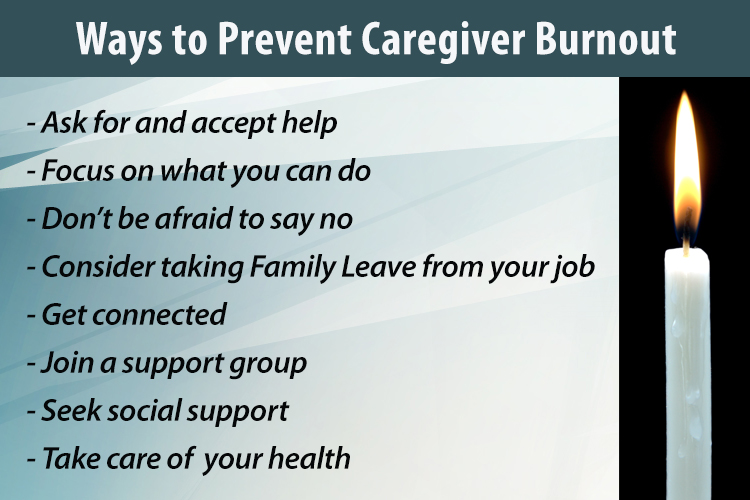Taking care of a loved one can provide a profound sense of purpose. For most caregivers, caring for someone they cherish feels good. And it can make your relationship stronger. But the demands of caregiving also cause emotional and physical stress, which can lead to caregiver burnout.
 Caregiver burnout is a state of physical, emotional and mental exhaustion that can happen when you dedicate time and energy to manage the health and safety of someone else. Caregivers who experience burnout may feel tired, stressed, withdrawn, anxious and depressed.
That can manifest itself in several ways. Some may find themselves giving up on activities they formerly enjoyed. They may experience isolation as they don’t have the time, energy or opportunity to socialize with friends or other family members.
Other impacts include feelings of anxiety or fear that if they do something wrong, they may hurt their loved one. One may feel anger and resentment that their loved one doesn’t recognize and appreciate them, or even guilt for taking time for oneself.
Caregiver burnout can impact a person in various ways, including physically, psychologically, financially and socially.
According to a 2020 AARP report, more than 41 million Americans are providing care to a spouse, family member or friend over the age of 50. Additionally, studies show that caregiver burnout is quite common with more than 60% of caregivers experiencing symptoms of burnout.
Caregiver burnout is a state of physical, emotional and mental exhaustion that can happen when you dedicate time and energy to manage the health and safety of someone else. Caregivers who experience burnout may feel tired, stressed, withdrawn, anxious and depressed.
That can manifest itself in several ways. Some may find themselves giving up on activities they formerly enjoyed. They may experience isolation as they don’t have the time, energy or opportunity to socialize with friends or other family members.
Other impacts include feelings of anxiety or fear that if they do something wrong, they may hurt their loved one. One may feel anger and resentment that their loved one doesn’t recognize and appreciate them, or even guilt for taking time for oneself.
Caregiver burnout can impact a person in various ways, including physically, psychologically, financially and socially.
According to a 2020 AARP report, more than 41 million Americans are providing care to a spouse, family member or friend over the age of 50. Additionally, studies show that caregiver burnout is quite common with more than 60% of caregivers experiencing symptoms of burnout.

Contact us to learn more about the Adult Day Program at Clermont Park and the community’s Memory Support and Assisted Living neighborhoods.
What is Caregiver Burnout?
 Caregiver burnout is a state of physical, emotional and mental exhaustion that can happen when you dedicate time and energy to manage the health and safety of someone else. Caregivers who experience burnout may feel tired, stressed, withdrawn, anxious and depressed.
That can manifest itself in several ways. Some may find themselves giving up on activities they formerly enjoyed. They may experience isolation as they don’t have the time, energy or opportunity to socialize with friends or other family members.
Other impacts include feelings of anxiety or fear that if they do something wrong, they may hurt their loved one. One may feel anger and resentment that their loved one doesn’t recognize and appreciate them, or even guilt for taking time for oneself.
Caregiver burnout can impact a person in various ways, including physically, psychologically, financially and socially.
According to a 2020 AARP report, more than 41 million Americans are providing care to a spouse, family member or friend over the age of 50. Additionally, studies show that caregiver burnout is quite common with more than 60% of caregivers experiencing symptoms of burnout.
Caregiver burnout is a state of physical, emotional and mental exhaustion that can happen when you dedicate time and energy to manage the health and safety of someone else. Caregivers who experience burnout may feel tired, stressed, withdrawn, anxious and depressed.
That can manifest itself in several ways. Some may find themselves giving up on activities they formerly enjoyed. They may experience isolation as they don’t have the time, energy or opportunity to socialize with friends or other family members.
Other impacts include feelings of anxiety or fear that if they do something wrong, they may hurt their loved one. One may feel anger and resentment that their loved one doesn’t recognize and appreciate them, or even guilt for taking time for oneself.
Caregiver burnout can impact a person in various ways, including physically, psychologically, financially and socially.
According to a 2020 AARP report, more than 41 million Americans are providing care to a spouse, family member or friend over the age of 50. Additionally, studies show that caregiver burnout is quite common with more than 60% of caregivers experiencing symptoms of burnout.

How to Prevent Caregiver Burnout
The emotional and physical demands of caregiving can strain even the most resilient person. To help manage caregiver stress: Ask for and accept help. Make a list of ways in which others can help you.
Ask for and accept help. Make a list of ways in which others can help you.- Focus on what you can do. At times, you might feel like you’re not doing enough. Believe that you’re doing the best you can.
- Don’t be afraid to say no. Make lists of what’s most important. Say no to requests that are draining, such as hosting meals for holidays or other occasions.
- Consider taking Family Leave from your job, if possible. Being able to focus on caregiving and not dividing your time, attention and energy can be instrumental in staying physically and mentally healthy.
- Get connected. Learn about caregiving resources in your area. There might be services that provide rides, meal delivery or house cleaning.
- Join a support group. Being with people who are experiencing a similar situation can be beneficial. They are more apt to relate to what you are dealing with. They can also help you solve problems.
- Seek social support. Stay connected to family and friends who support you. Make time each week to visit with someone, even if it’s just a walk or a quick cup of coffee.
- Take care of your health. Find ways to sleep better. Move more on most days. Eat a healthy diet. Drink plenty of water. See your health care professional for vaccines and regular health screenings.
- Assess yourself for burnout. Check in with yourself and know what your limits are. Don’t be afraid to make an adjustment to your caregiving journey. Practice self-care, whatever that may look like for you.




